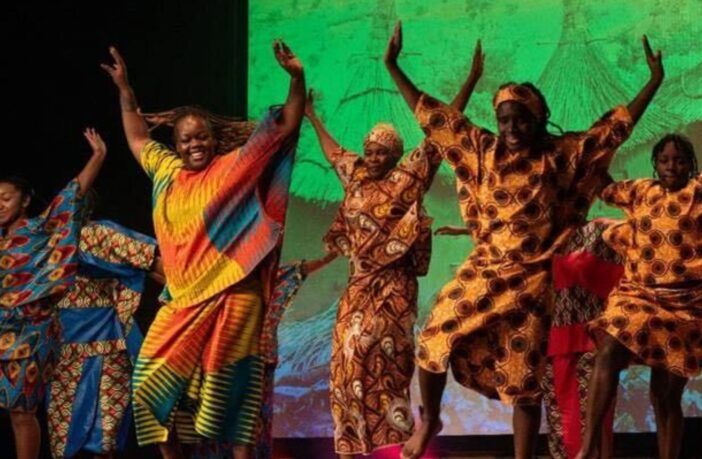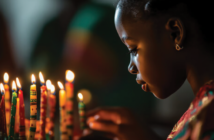Each year, a Brooklyn church honors their enslaved African ancestors by looking to the past while trying to improve the present.
By Rev. Dorothy S. Boulware
Word in Black
Overview:
At a time when some governments and schools are resisting or eliminating the teaching of Black history, St. Paul Community Baptist Church centers it with eight days of programming, sweeping in self-care and healing from generational trauma.
Sign up for our Daily eBlast to get coverage on Black communities from the media company who has been doing it right for over 130 years.
Combining faith with elements of art, history and public health, the MAAFA festival at St. Paul Community Baptist Church in Brooklyn is a spectacle celebrating the Black experience. (Credit: St. Paul Community Baptist Church)
Each year, St. Paul Community Baptist Church in Brooklyn sets aside time to mark history and remember how enslaved Africans brought to America suffered during the Middle Passage. The mid-September observance is called The MAAFA, a Swahili term that denotes disaster, terrible occurrence or great tragedy.
While other cultures commemorate their history, people of African descent in this country are often encouraged to forget theirs, to the extent that history pages are edited and books are forbidden in public schools in some states. This will never happen as long as St. Paul is insistent on honoring the folks who endured and the people who belong to them.
]]>
Over eight days, the church will hold seminars and workshops for teachings and discussion not only about the history, but about the trauma that has transcended generations — and is the backdrop for current issues of pain and deprivation that pervade the African- American community.
The Rev. Dr. David Brawley, lead pastor of SPCBC, says this year’s celebration – coming amid what experts say is the most consequential presidential election in our lifetimes – seems particularly relevant. With Vice President Kamala Harris poised to make history as the first woman of color elected to the White House — but conservative judges and politicians intent on rolling back civil rights protections — the stakes are high.
“In a year marked by national uncertainty and mounting threats to our democracy, we find ourselves at a critical juncture,” Brawley says. “The dangers posed by certain federal policy proposals remind us of a time when the voices of Black people were silenced, and our human rights were denied.”
Yet the challenges “deepen our resolve to fully embrace our cultural identity and fortify our community,” says Brawley, describing the theme of this year’s celebration. “Our focus on ‘Reclaiming the Village, Restorying Our Past’ is not just a theme but a necessary response to the times. It is a resolute commitment to preserving our heritage and empowering future generations to carry it forward.”
]]>
The event, which runs from Sept. 14 to Sept. 22, is centered, in part, on health and healing.
Sessions and events include:
Trauma and health: How the generational trauma of slavery continues to affect the mental and physical health of descendants of the enslaved, contributing to disparities with whites in chronic health conditions like hypertension, mental health disorders and chronic stress.
Community healing practices: Creating a space where art, spirituality, and community come together to facilitate collective healing, an approach that has proven beneficial in managing trauma.
]]>
Relevance to current health crises: Connecting ongoing conversations around racial disparities in health care to the long-term effects of racism and historical trauma on community health.
The week includes a theatrical production, “The MAAFA Suite…A Healing Journey.” The play explores trauma, ongoing pain and oppression of Africans in America and their descendants living in a White society.
“The MAAFA Suite is a profound exploration of our shared history, crafted to evoke deep emotions and catalyze healing,” Brawley says. “Each year, we step into the sacred space of remembrance using art as a tool to honor our ancestors and ignite transformative healing within our community.”
The healing intent of the play, he adds, “lies in its ability to create space for both mourning and hope for Black people living in America. It is a spiritual journey that confronts painful truths of slavery and hundreds of years of oppression, while offering a path toward reconciliation and renewal.
]]>
“In a world that continues to be divided, this production reminds us that healing is not only possible but necessary for our individual and communal survival.”
The play, he concludes, “is not just a production–it’s a journey of reclamation and renewal.”
This article was originally published on WordinBlack.com.
Get your AFRO A CARD today!
Help us Continue to tell OUR Story and join the AFRO family as a member. Members will receive exclusive journalism, and directly support the future of the AFRO. You can choose from three membership plans below.



